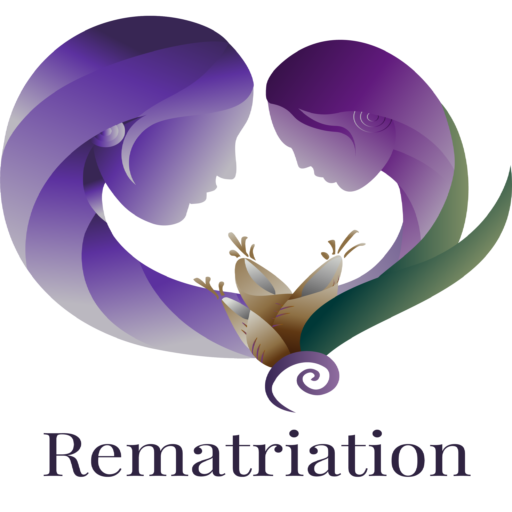Cornell Indigenous Students Fast to Support Palestine
A Cultural Practice in Community for Solidarity
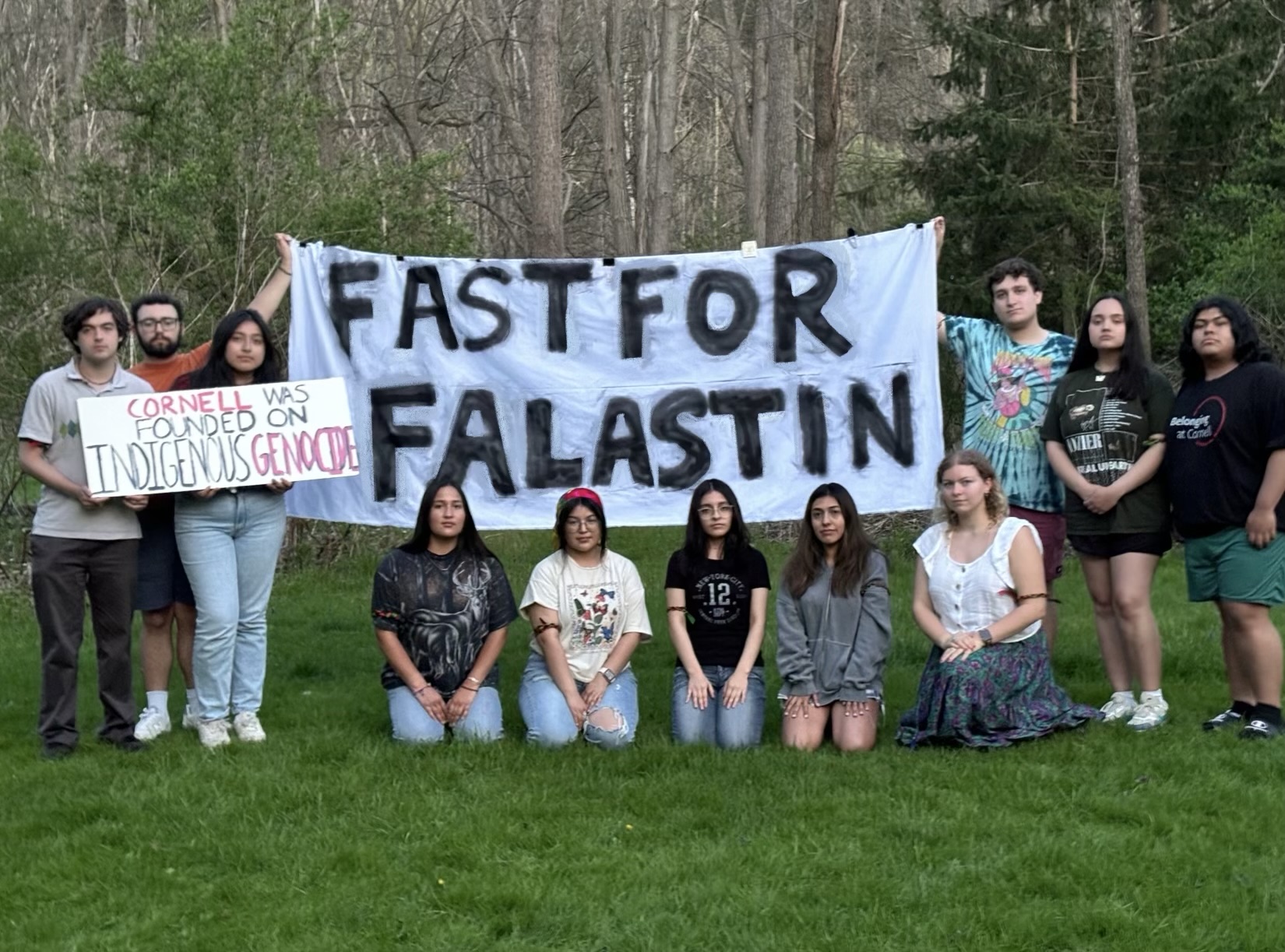
Indigenous students at Cornell prepare to fast.
A group of Indigenous students from Cornell University are planning a four day fast from Tuesday, April 30th to Friday, May 3rd to show their solidarity with Palestine. The fasters are braiding ribbons to wear as armbands in colors of the Palestinian flag and to signify their fast. Leaning into their cultural practices of fasting and community support, they discussed how fasting is a tool for personal growth, collective healing and community building.
Rematriation’s team had the opportunity to sit with two Indigenous students at Cornell to discuss their decision to fast in solidarity with Gaza.
Yanenowi Logan and Amaya Garnenez are helping organize the fast and have emphasized its power in reflection, prayer, and community engagement. The students both also shared the connection between colonialism and the resulting weaponization of identity, resources and land. The genocide of Palestine aligns with the struggle Indigenous Peoples’ have faced and continue to push back against in this country.
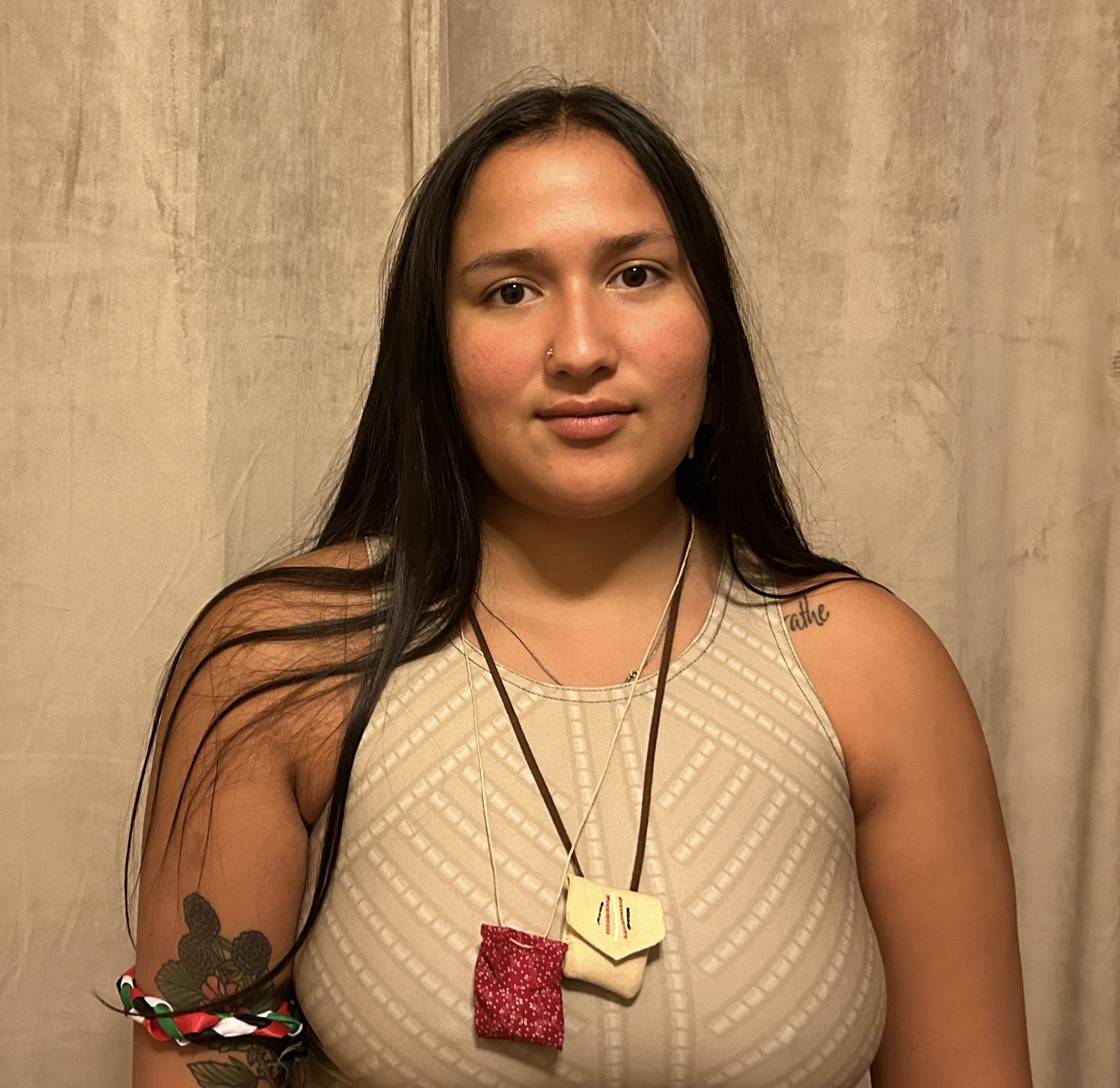
Yanenowi Logan wearing her armband and traditional medicine pouches.
Yanenowi (She Guards the Corn) Logan is a member of the Seneca Nation of Indians, and is a senior in Environment & Sustainability. Logan is a member and former co-chair of Native American and Indigenous Student Association at Cornell (NAISAC), the media chair for American Indian Science and Engineering (AISES), the co-president of the Youth Commission with the National Congress of American Indians (NCAI), and previously served as the commission’s vice president.
“Yá’át’ééh. Shí eí Amaya Ba Nízhoní Garnenez yinishé. Naaneesht’ézhí nishłį́ Tódích’ii’nii báshíshchíín Ta’neeszahnii dashicheii Kinłichíí’nii dashinálí,”
– Amaya Garnenez who introduced herself and her clans in her language
Garnenez is Diné, a member of Navajo Nation, from Shiprock, NM. She is a junior student studying chemistry and American Indian and Indigenous Studies and aspires to obtain her Ph.D. in chemistry to teach advanced sciences to Indigenous students. Deriving her life’s purpose and values from her people’s philosophies and teachings, Garnenez has done previous activism work within the Black Lives Matters Movement within her community in New Mexico, and continues activism that aligns with her morals as an Indigenous person.
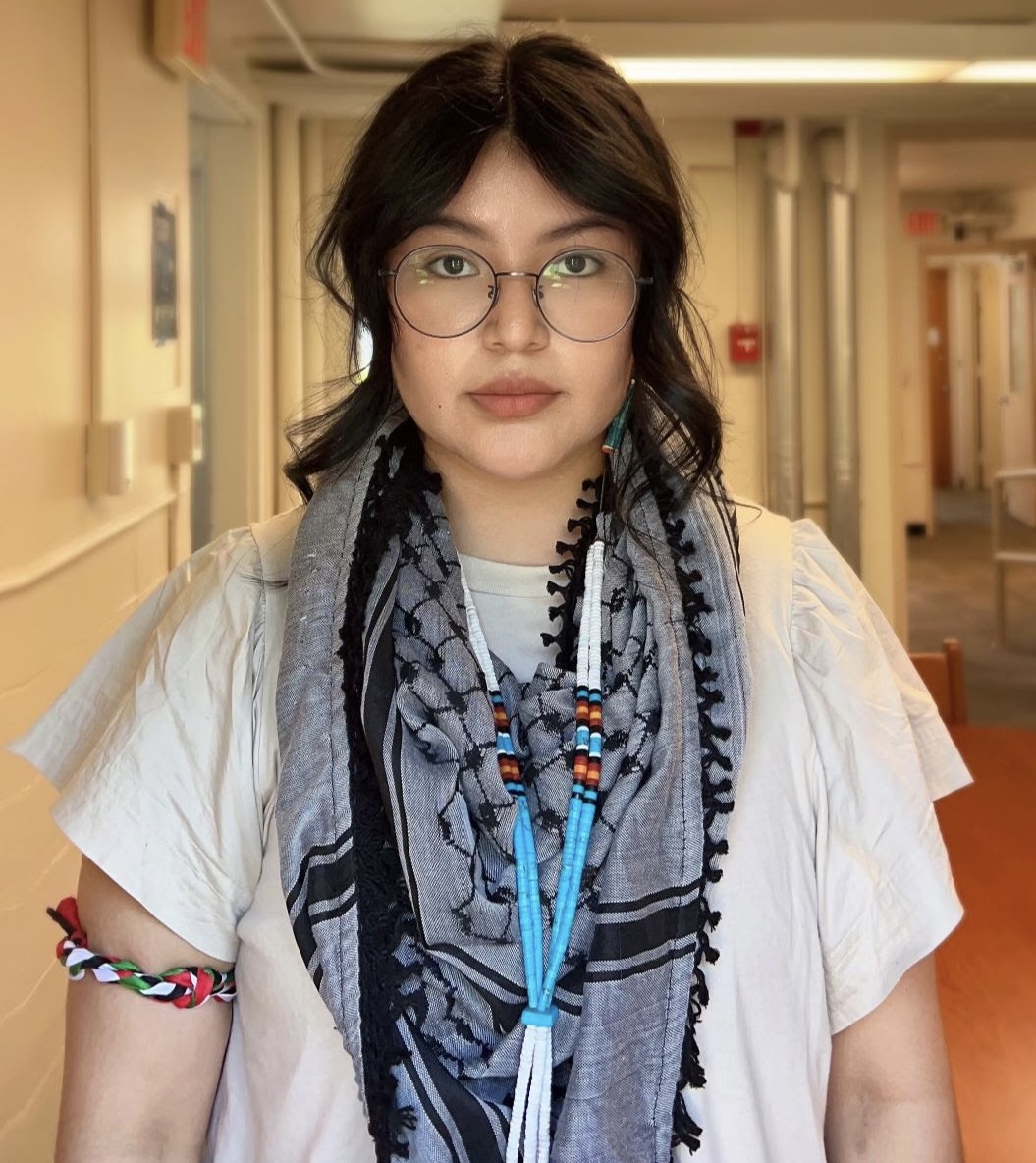
Amaya wearing her armband, a keffiyeh and her traditional Diné jewelry.
Cornell University’s environment has long felt like an unsafe space for many Indigenous students. In recent news, anti-indigenous rhetoric has evolved on campus, including violent and aggressive statements online. Indigenous students continue to pursue action from the University’s administration on historical injustices. Many expressed frustration with Cornell University’s lack of action on Indigenous demands for rematriation of stolen land and lack of acknowledgement of its participation and benefit as one the country’s largest Land Grant Institutions.
“I also have personal goals, like I do want to reestablish myself as a person, and to reestablish the space that I am in and who I am as a person. Partaking in the ceremonial fasting will definitely be a lot of mental and spiritual healing and I think that’s needed. For the past couple of days, we have seen online through anonymous school platforms of anti-Indigenous rhetoric, and that has been very detrimental to my mental health and spiritual being. I start to lose a sense of identity. I want to reclaim myself, and reclaim my purpose for being here and taking up these spaces.” – Amaya Garnenez
Inspired by students at Brown University, Indigenous students at Cornell are seeking to reclaim their spot in the movement and connect their demands to their Indigenous identity. A group of students from different Indigenous nations at Cornell University decided to fast in solidarity with Palestine, citing cultural and spiritual practices as protection under university policies. This is a group of individuals who want to hold prayer with community, in solidarity with Gaza.
Fasting is an individual-based initiative with no organizational attachment. This initiative is to support Palestine by honoring their own Indigenous cultural ways of fasting, and in doing so also raise awareness about food sovereignty. In the context of the Israeli-Palestinian conflict, Yanenowi emphasized, “the power of food in Indigenous communities and the need to recognize and respect the relationality between Indigenous peoples and their land.”
“It was important for a lot of our students to express how food has been weaponized against the people in Palestine, over this genocide and how our resources and their resources have been just purely weaponized and held against them. People are starving to death, literally. And so, traditionally, a lot of times when people die, or when we do have rites of passage, your loved ones on Earth eat for you. They make sure that your spirit is nourished, and I think in doing a fast, we’re calling for that, we’re calling for that recognition.
For us to see that relationality, we need to be better, better relatives that will put in the work here for them because they can’t. So I think that was just a big part of it. We talked about the power of food and food sovereignty in our communities and what that has looked like over time.

Native American & Indigenous Students At Cornell (NAISAC) at a Teach-In.
Indigenous students held conversations around the genocide happening in Palestine and comparing the “ecocide” in Gaza of burning of their olive trees and agricultural fields, to the of the Clinton Sullivan Campaign that was waged against the Haudenosaunee. In that military campaign the U.S. government burned the orchards and cornfields, and across the country, killed millions of bison in an effort to starve and eradicate Indigenous Peoples from the land. “That was an effort to erase who we were. That was an effort to erase our way of life. And they are doing that now in Palestine. These colonial entities weaponize who we are and how we’re connected to the land,
“By addressing the fact that we can go without food – they can take away our food, they can take away our resources, but we will persevere. Just our presence as Indigenous Peoples today has shown that resistance – that you can put us in residential schools, you can murder and rape our women, and burn our fields and you can do that, but we’re still gonna be here. We want to represent that the Palestinians will also live forever. Their legacy will live on forever. By doing this fast, we want to pay homage to this in some respect and make this connection for people who may want to be allies to the Indigenous movement or allies to the environmental movement, but haven’t yet wanted to look at what’s going on in Palestine.” – Yanenowi Logan
Fasting is done differently across Indigenous nations, with no one way being the same. This particular fasting event signifies a form of resistance and solidarity among Indigenous Peoples. Yanenowi reflects on her personal journey of healing and empowerment through community support. It is important to recognize the interconnectedness of Indigenous and environmental issues, and the need to “honor who we are” through fasting and expressing support for others in this way.
Amaya looks back on previous activism work within her community on the Navajo nation. “I’ve always been interested in activism and research. As somebody who is very active within the political climate and social climate, I’m trying to find a solution. That’s just me as a person who’s always trying to be helpful in finding solutions”.
The Indigenous students at Cornell hope that this fast will lead others to recognize the various ways they can be engaged and support Indigenous and environmental causes. They hope others will feel free to hold space personally against this genocide and for the missing and murdered persons felt in all spaces of genocide.
The divide between students and administration has become more defined in recent weeks. The establishment of “liberated zones” on Cornell’s campus comes as students at universities like Columbia and NYU have organized similar encampments calling on their universities to support divestment. The encampments at Columbia and NYU have seen dozens of protesters arrested by the NYPD and subject to disciplinary action such as suspension.

Cornell students in a Liberated Zone on campus.
Students flying the Palestinian Flag and holding a Land Back sign.
Organizers have said that “liberated zones” are spaces where students, staff, faculty, and community members can gather in solidarity with Gaza and demand accountability from the university. They say the zone serves as a space for nonviolent resistance, hosting teach-ins, art builds, and other activities to raise awareness about the urgency of addressing the crisis in Gaza.
Student groups at Cornell formed The Coalition for Mutual Liberation and have begun an occupation of the University’s Arts Quad. “Liberated zone” encampments have been created on campus, a sign of growing support for the movement, calling for Cornell to divest from weapons manufacturers that are complicit in the ongoing violence in Gaza.
“The campers’ ongoing act of nonviolent resistance will include teach-ins, art builds, and other activities to highlight the urgency with which Cornell must act in response to the Israeli government’s genocide of Palestinians in Gaza. Students from across the globe have joined together to protest the genocide in Gaza during which the Israeli Offensive Forces have murdered over 34,000 Indigenous Palestinians in under seven months,” (CML website)
“Students are organizing in outrage that Palestinian universities have been obliterated with weapons funded and developed through Cornell University’s partnerships and investments. Distinctly, the Cornell University Board of Trustees adopted a commitment in 2016 to divest from companies engaged in ‘genocide, apartheid, and systematic cruelty against children.’ Cornell’s failure to divest is not only a violation of the university’s stated policies, but also an act of genocide denialism.” (CML website)
Hundreds of Cornell students, faculty, and community members gathered around outside of the “liberated zone” to support its efforts. This action marks a culmination of efforts following a historic student referendum where undergraduate students voted to call for a permanent cease-fire and divesting from ten weapons manufacturers, including Boeing, ThyssenKrupp, Elbit Systems, RTX, and Lockheed Martin. The referendum passed with a 2:1 ratio and highlighted a growing sentiment among students to take a stand against the violence in Gaza.
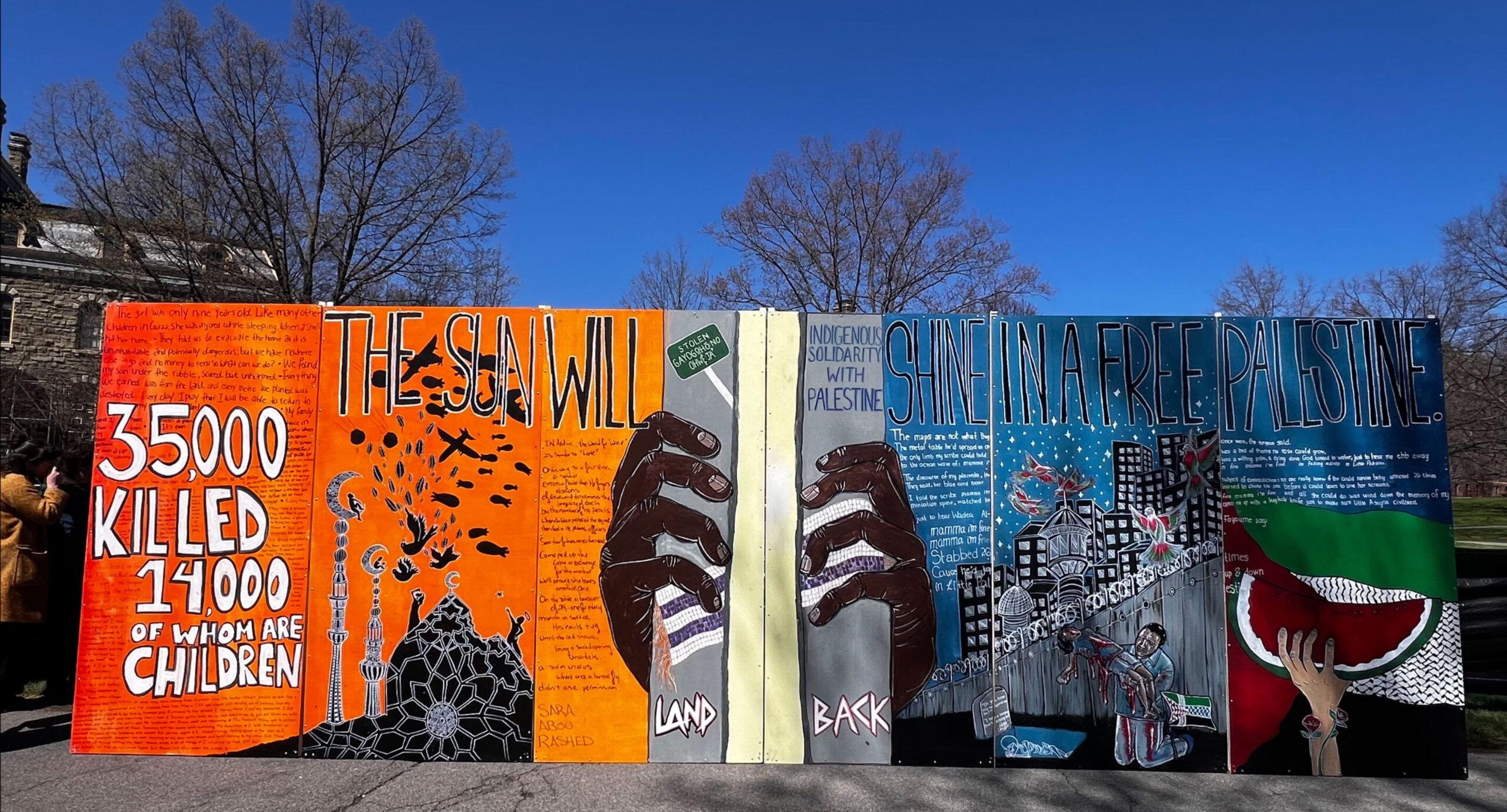
On the Coalition for Mutual Liberation’s webpage https://cmlithaca.org/about-us, the Coalition sets forth the following demands to Cornell University’s administration:
1. Acknowledge its role in the national genocide of Indigenous Peoples through the Morrill Act and its sale of nearly 977,909 of Indigenous land; return all mineral interests to Tribal Nations dispossessed by the Morrill Act; provide restitution for the dispossed nations; provide restitution for the Cayuga Nation; establish an Indigenous Studies department; and return surplus land in New York state to the Haudenosaunee Confederacy, the Lenni Lenape (NYC campus), and their descendants who have been forced out of New York.
2. Annually disclose a comprehensive account of its endowment and land holdings, and divest from entities, involved in ‘morally reprehensible activities,’ in accordance with Cornell’s 2016 Standard to Guide Divestment Consideration.
3. End profit-generating partnerships, volunteer arrangements, and other significant corporate and academic affiliations with institutions involved in ‘morally reprehensible activities’ including but not limited to the dissolution of the Jacobs-Technion Cornell Institute and all other partnerships with the Technion Israel Institute of Technology.
4. Call for an unconditional, permanent ceasefire in Gaza.
5. Establish a Palestinian Studies program housed in the College of Arts and Sciences, along with an accredited minor that is available to all undergraduate and graduate students. Representatives from Cornell’s chapter of ‘Students for Justice in Palestine’ must serve on the committees that oversee the hiring of the program’s faculty.
6. Publicly acknowledge and protect anti-Zionist speech, viewpoints, and histories in both religious and academic contexts. Recognize the legitimate and historical claim that anti-Zionism is not anti-Semitism.
7. Remove all police from campus, beginning with the elimination of police presence at demonstrations. Replace police with an emergency response team composed of healthcare workers and first responders trained in de-escalation. A majority of team members must be providers who share lived experiences and identities with Cornell’s diverse student body.
8. Ensure total legal and academic amnesty for all individuals involved with the Liberated Zone and related demonstrations.
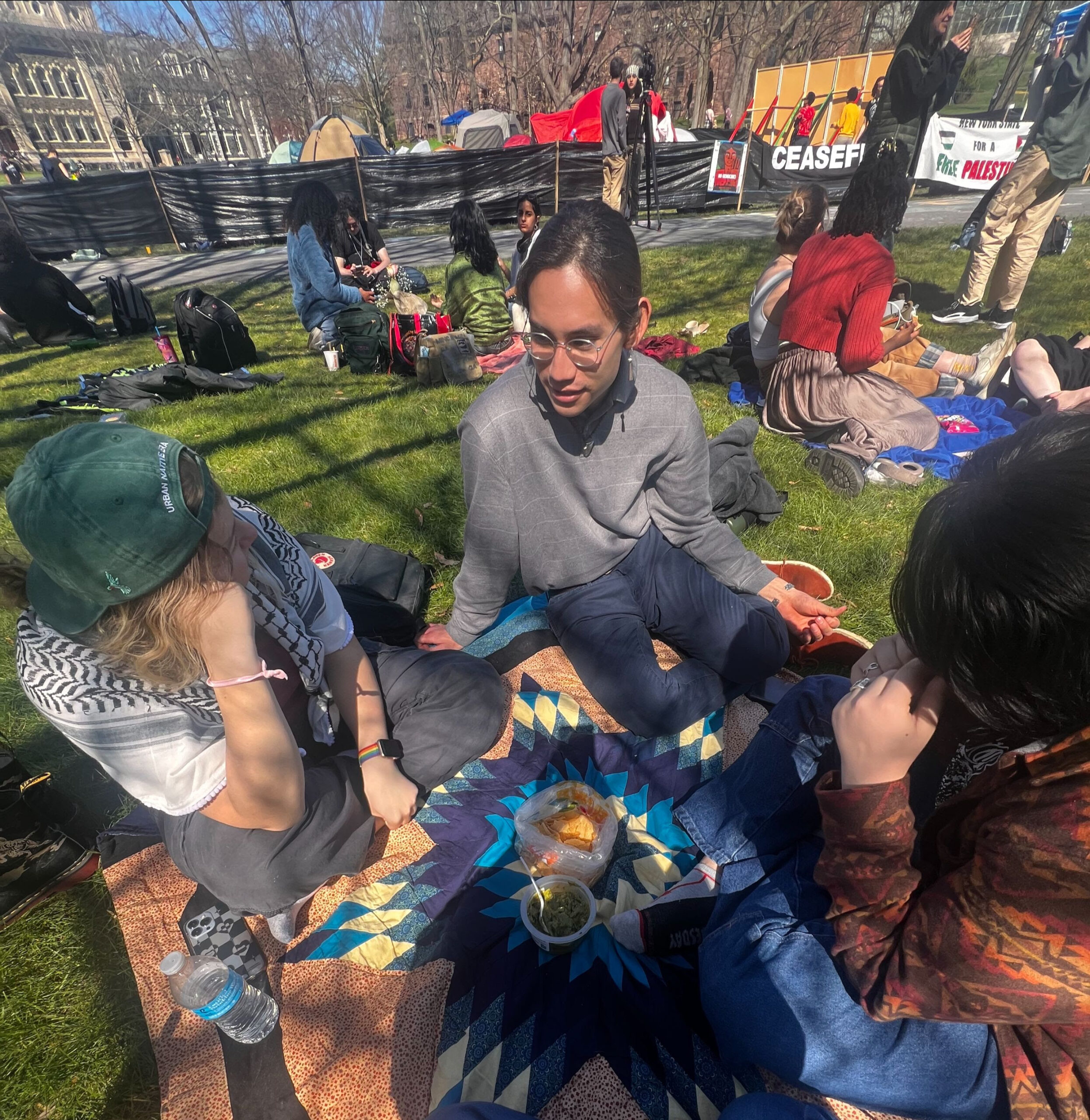
Indigenous students show support for the fellow Cornelians
by gathering outside the encampment.
To show support for students who are active in the encampment, Native American and Indigenous Students at Cornell (NAISAC) hosted a dialogue event, outside the encampment, on genocide in Gaza. During the dialogue, Yanenowi focused on her Indigenous identity and demands at Cornell, mentioning organizational issues and anti-Indigenous rhetoric on social media.
Much of the audience had a difficult time understanding the connection of the first demand. This is not to place Indigenous issues at the forefront but to budge the University in a direction of responsibility and acknowledgment. “And so we just wanted a way to say, yeah, we were here. We’re a part of this. We’re standing for this. This is something that we’re doing, and this is connected to us.” -Yanenow Logan
“In Navajo culture, fasting is something that has been around but not very actively participated in. We have the solar eclipse fasting, which is only for a while, but there has been other practices of fasting for longer periods. It’s to help us reconnect spiritually, mentally, physically, and emotionally. Preparing for this is realizing what I’m getting myself into. Then also, it’s a way to refocus what my goals are with this fast and with showing solidarity,
“Helping my school’s community that’s very active in calling for ceasefires, and for divestment, and within my limitations, because I don’t want to risk getting suspended, nor arrested. I work so hard to get to where I am. It’s showing my solidarity, the best way that I know how, which is using all the Indigenous teachings and Navajo teachings that have brought me here to where I am today,
And so, I think preparing for this is setting goals, what’s the outcome of this fasting? What is the outcome of what the world is hoping for? I obviously do want a ceasefire, and I do want Palestinians to have a chance to restore the lives and the lands that they have lost. I think that’s the goal that I envision at the end of fasting,” said Garnenez
Yanenowi mentioned the potential consequences of participating in a hunger strike at an Ivy League University, including suspension and loss of graduation privileges. Yanenowi expresses her excitement and sense of community with fellow Indigenous students in preparation for the fast. Yanenowi is excited and nervous about the fast, hoping to gain support from Indigenous professors and staff on campus.
During the fast, the students aim to simply make space for one another, not to make demands.
“It is important to create dialogue that highlights the importance of Indian Country’s involvement in the Israeli-Palestinian conflict,” as Yanenowi cited the Navajo Nation’s partnership with Raytheon, a major U.S. defense contractor and industrial corporation with manufacturing concentrations in weapons and military and commercial electronics. “Indigenous allies are a necessity for the movement, share your knowledge and support other initiatives.”
The Indigenous students at Cornell will be hosting a community gathering each day of their fast on the arts quad, adjacent and not engaged with the encampment. During the fast, community gatherings are being planned outside of Akwe:kon, the University’s residence hall for Indigenous students. Here, prayer and talking circles will be held for solidarity. The students are entering into their fast with a community feast, and breaking their fast at the American Indian and Indigenous Studies Program (AIISP) Awards Ceremony.
Indigenous students at Cornell are planning a Missing and Murdered Indigenous Women (MMIW) on May 5th, engaging with Indigenous organizations to honor missing and murdered Indigenous people. To support further initiatives of the Native American and Indigenous students at Cornell (NAISAC), follow them on Instagram: @cornellnaisac.
Published by Rematriation on May 1, 2024
By Caryn Miller (Seneca) & Afton Lewis (Diné)
